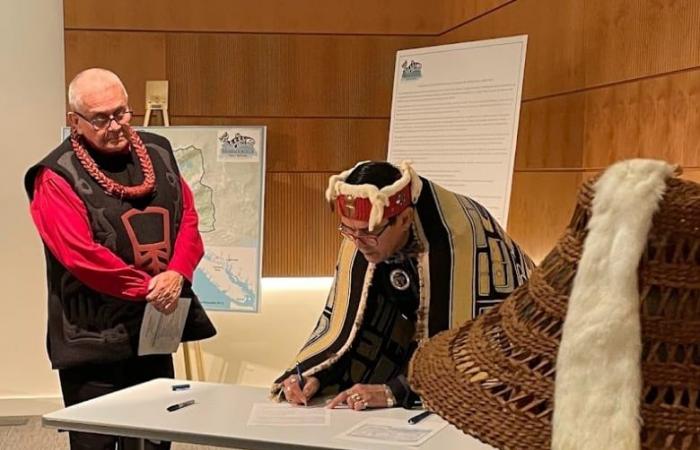Arabnews24.ca:Sunday 5 February 2023 07:17 PM: Provincial officials and First Nations leaders announced they will be closing fisheries and establishing a "marine refuge" along the Central Coast of B.C. Sunday.
The announcement was part of the IMPAC5 global ocean conservation conference in Vancouver, where representatives from 123 countries are meeting to discuss the state of the world's oceans.
As part of the conference, the federal government, along with 15 coastal First Nations, said they're creating a protection plan for the Northern Shelf Bioregion in B.C. — which extends from the top of Vancouver Island all the way to Alaska, includes a number of islands and the Great Bear Rainforest.
The first significant piece of that plan will be full protection of the marine environment in the Gwa̱xdlala/Nala̱xdlala (Lull Bay/Hoeya Sound) area — located up Knight Inlet on B.C.'s Central Coast.
Located off the northeast coast of Vancouver Island near Campbell River, the area stretches over 21.2 square kilometres — five times the size of Vancouver's Stanley Park. The inlet is home to a unique sponge and coral reef, estuaries and salmon-bearing streams.

"While this may be a relatively small area, in the grand scheme of areas that need to be protected, we cannot overstate the value of conserving and protecting this priceless area," said Fisheries Minister Joyce Murray at the conference.
"This new marine refuge contributes to meeting Canada's marine conservation targets of protecting 25 per cent of the oceans by 2025 and 30 per cent by 2030," she added.
Murray's announcement, which was made with B.C. Resources Minister Nathan Cullen and Chief Winidi (John Powell) of the Mamalilikulla First Nation, comes after the First Nation itself had declared the area an Indigenous Protected and Conserved Area (IPCA) in 2021.
That declaration followed reports of emaciated grizzly bears and dwindling salmon stocks in the region, with Powell saying at the time that it was a "constructive challenge" to the provincial and federal governments to work together with his nation.

"In addition to protecting and conserving, we have to reconnect generations of our people who didn't recognize Gwa̱xdlala and Nala̱xdlala as our own," the chief said on Sunday.
"It's a lot of work ahead of us, but we hope that we are setting a path that not only our own children, but other First Nations will take up."
The federal government says all commercial and recreational fisheries in the area will be shut down. It said this is the first of many regions that will be protected under the so-called marine protected area network action plan.
Conservationist praises plan
Environment Minister Steven Guilbeault said in a statement that the conservation plan was "closely related" to a previously-announced $800 million funding plan for Indigenous-led conservation initiatives.
That funding specifically went to the Northern Shelf Bioregion and the Great Bear forest, with the help of Project Finance for Permanence (PFP).
The PFP is a funding model that channels contributions from Indigenous communities, all levels of government and philanthropists to provide long-term protection for land and water.
"This is a huge milestone for biodiversity conservation and Indigenous stewardship in B.C.," Kilian Stehfest, a marine conservation specialist with the David Suzuki Foundation, said in a statement.
"Once implemented, this network will act as an insurance policy against management failures and unprecedented environmental changes."
The government says this is the first marine protected area network in Canada, and will be co-governed by Indigenous, federal and provincial governments.
"Our ability to come together as Indigenous people, as we have for 14,000 years, has led to this position where we're doing this together," said Dallas Smith, the president of the Nanwakolas Council.
The council, which negotiates marine planning agreements on behalf of seven First Nations bands located across the Great Bear Rainforest, says it hopes to lead from the front when it comes to conservation in the area.





